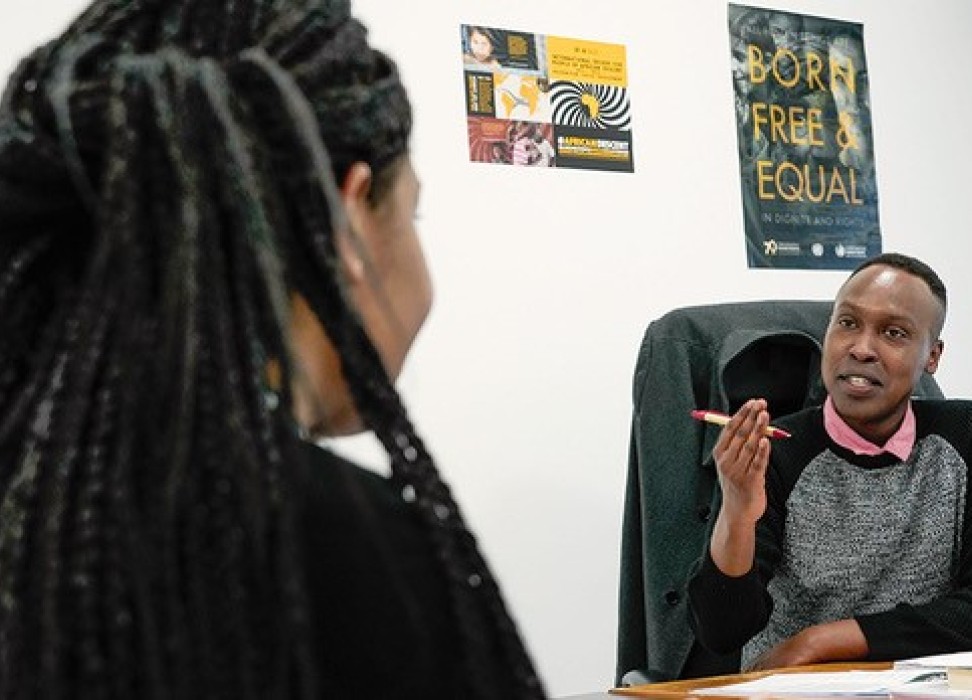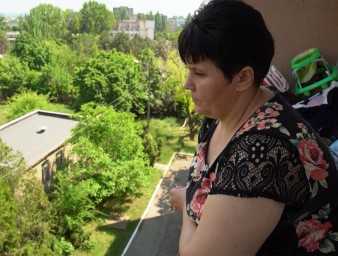COVID-19: Standing up for the human rights of migrants and refugees in France
03 June 2020

fe
Fleeing from Burundi to France at the age of 18, Steve Irakoze is well aware of the hopes, fears and needs of refugees and migrants. When he arrived in France, Steve began helping LGBTQ asylum seekers, while at the same time studying law and political science. He also volunteered in refugee camps in Calais, shaping his desire to work for the benefit of people who had been uprooted from their homes.
In 2018, Steve took part in the UN Human Rights Fellowship for People of African Descent, a program for people who are engaged in promoting the rights of people of African descent.
Today, Steve is working for La Cimade, a French civil society organisation dedicated to ensuring the human rights of migrants and refugees. The organisation provides legal aid to around 100,000 people per year, and conducts advocacy and strategic litigation to ensure immigration reforms are human rights-based. They also monitor the implementation of migration policies within the European Union and in North and West Africa.
France is one of the European countries most severely affected by the COVID-19 pandemic, with migrants and refugees being particularly hard hit. Steve explains the major concerns they face, how he and his organisation have been pushing for change to tackle inequalities, and how our support for the human rights of the most vulnerable will help achieve inclusive societies where no one is left behind.
“The COVID-19 pandemic has exposed the inequalities in our society.
In France, the virus has made issues for migrants and refugees even more pressing. For example, in deportation centres, crowded conditions make it impossible for them to do social distancing. The lack of protective gear and the lack of testing puts them in a very vulnerable position.
Asylum seekers and unaccompanied migrant children in France were already at high risk due to the lack of public housing and the length of administrative and judicial processes to secure a legal status. When COVID-19 came, and lockdowns were implemented, these people were in crisis. You can’t shelter in a place when you don’t have a home.
Between March and May during lockdown, people needed a special form to go out for groceries, or to visit the doctor. But the forms were only available in French. Despite our advocacy efforts, we received several accounts of people fined because they were unable to justify why they were not at home. We heard reports of undocumented people just giving up on medical services or not going to buy groceries as they were too afraid of police checks.
Not everyone had the luxury to self-isolate and still keep their jobs.
Many people needed to go to work and disadvantaged members of our communities, which too often were racial minorities or migrant communities, were the ones who had to keep working. Undocumented migrants were working and keeping society afloat while everyone else was locked up. They kept delivering parcels, they kept working in grocery stores, they kept cleaning. So we need to appreciate them and we need to make sure that they are part of any recovery plan that the government wishes to put in place.
We remain particularly concerned about what is happening in France’s overseas territories. For example in Mayotte, an archipelago in the Indian Ocean, systemic inequalities are only getting worse. Issues such as limited access to healthcare and housing are affecting the poorest. They are still in lockdown there. We’re urging the authorities to address the bigger picture of deteriorating human rights, not just the immediate effects of COVID-19. Without seeing the bigger picture, the response simply cannot be sustainable.
Trying to send people back to their countries during a global pandemic is clearly not the best solution.
Right now in France, my organisation and I are trying to address the deportation policies that have been maintained, which are inconsistent with border closures, travel restrictions and even the World Health Organization recommendations.
We’re pushing for a comprehensive approach from the authorities. When policy makers are defining their response, they have to bear in mind economic and racial inequalities, and especially issues affecting migrants and refugees. Asylum seekers already face issues when seeking healthcare; refugees often have to endure poor living conditions on arrival; undocumented migrants who have had to stop working are excluded from unemployment benefits. All of these kinds of factors need to be taken into consideration in the COVID-19 response to better address the human rights situation.
I hope the future will not be the same. I hope we don’t go back to normal.
We cannot pretend nothing happened and continue on the same path. We need to address inequalities, and we need to provide a human rights-based response to the situation of migrants and refugees. It is extremely important to voice our concerns about human rights in this particular period, because we are seeing governments resolved to doing things in a much stronger way than they were months ago.
In many cases, government actions are unprecedented. This is the perfect time to stand up for human rights, to make them listen and to make them understand how social and economic disparities affect particular groups so that the response can be inclusive of everyone.”
Disclaimer: The views, information and opinions expressed in this article are those of the persons featured in the story and do not necessarily reflect the official policy or position of the Office of the UN High Commissioner for Human Rights.
3 June 2020



